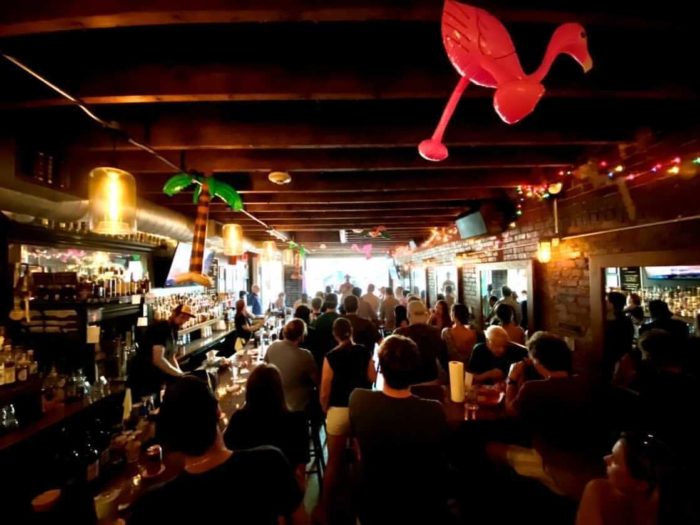
Following a win, industry activists push for permanent to-go cocktails
On the evening of June 28, hospitality workers and activists who had spent the last year advocating for cocktails to-go met for drinks in person. At the full-capacity Cocktails for Commonwealth event held at the Quiet Few in East Boston, attendees sat shoulder-to-shoulder at the bar, hovering over mezcal Negronis and Irish whiskey picklebacks. The scene suggested that the pandemic and its effects on the Bay State’s restaurant business had fully receded, but the evening’s speakers told another story.
Chris Almeida, beverage director at the Tasty in Plymouth and state organizer for the independent restaurant advocacy organization the Thirst Group was the first to speak. He began by thanking fellow attendees including bartender Jackson Cannon, who spearhead the #cocktailsforcommonwealth campaign on social media and contributed language to early legislation, and State Sen. Diana DiZoglio, who filed the bill that eventually allowed for takeout cocktails in Massachusetts on July 20, 2020.
As organizer Jackson Cannon told us at the time, even though the Mass initiative is a relatively “modest approach,” in which a bar or restaurant can “sell a double pitcher’s worth, by volume,” which Cannon said is “not going to stop anyone from getting their favorite vodka or tequila at the liquor store,” it’s nevertheless “something that we needed at the beginning [of the pandemic], this is something that we need now, this is something we need for years.”
To-go cocktails and their advocates recently enjoyed another legislative victory, which the event was intended to commend. On June 16, one day after the measure’s initial expiration in tandem with the Mass state of emergency, Gov. Charlie Baker signed a bill extending takeout cocktails until May 1, 2022. However, Almeida contended that more time is needed to make the industry whole.
“The Massachusetts Tourism association says it’s going to take us five years to recover from COVID. And everyone thinks that this is over. This is not over. And we need all the revenue streams that we can get.”
Almeida brought attention to another bill filed by DiZoglio, S.196, that would extend to-go cocktails until June 2023. But he also expressed his desire to see the measure live on in perpetuity. “Moving forward, we’re going to work on cocktails to go forever,” Almeida said.
If the Bay State were to enshrine carryout Cosmopolitans, it wouldn’t be alone. Fifteen states and the District of Columbia have already made to-go cocktails permanent, and others are getting closer: on June 16, the Pennsylvania senate passed a bill that would grant takeout cocktails permanency in the Keystone State.
Almeida also expressed his frustration with the Massachusetts Restaurant Association, which he feels has been insufficiently supportive of independent restaurants. He then stressed the importance of organizing individuals to advocate for continued takeout cocktails as well as caps on third-party delivery frees.
“Our family members and friends love what we do. They love to support us and there’s no reason why they wouldn’t want to make a phone call or send an email on our behalf. Those are the people we need to rally.”
Joe McGuirk, a veteran of the local hospitality scene who is running for Cambridge City Council, took the floor next. “I’ve been a bartender for 30 years in this city,” he said, “and last June was the first time I’ve been out of work since I was 14 years old.”
If elected, McGuirk said he would be the second renter and first restaurant industry worker currently seated on the nine-person body.
“They need another renter in there,” McGuirk said, “66% of Cambridge rents. There’s not one person who works in the restaurant business that serves on City Council. We need voices to advocate for us that come from where we are.”
DiZoglio, who Almeida introduced as Cocktails for Commonwealth’s “strongest ally,” spoke last. The senator representing the Merrimack Valley said she was spurred to action after watching local restaurants struggle amid pandemic restrictions and looked at how other states were legalizing to-go sales of alcohol to create alternate revenue streams.
“We were among the first in the region to file for it, and unfortunately one of the last to pass it,” DiZoglio said. “We saw New Hampshire do cocktails to go. We saw Rhode Island do cocktails to go. We saw New York do cocktails to go. Even though we were one of the first to file. There’s a reason for that.”
The reason, according to DiZoglio, is the outsized influence of the Massachusetts Package Store Association, whose representatives testified against her initial legislation allowing for take-out cocktails.
“They have very strong lobbyists who are paid exorbitant amounts of money to protect the interests of those who already have a monopoly on this industry,” DiZoglio continued. “They do not have the best interests of our small mom and pop shops, our friends, our bartenders, our servers in mind and they are spending a lot of money right now to stop these proposals from moving forward.”
DiZoglio also underscored the continued challenges faced by local restaurants, which she feels are less visible now that they have fully reopened.
“A lot of my colleagues may be seeing that people are out, and it looks like everything’s fine and dandy and that our restaurants are thriving again,” she said. “But they’re not thriving yet. They’re still in survival mode and we should be doing everything and anything we can to get them back up on their feet again. This is just one common sense, ridiculously simple thing that we could be doing to help them. There is no reason why we could not pass cocktails to go in the state of Massachusetts and make it permanent.”
Ending with a call to action, DiZoglio implored those in attendance to get in touch with their local representatives.
“Call your legislator. Call your senator. Call your chambers of commerce, let them know that you want your chambers to support this and write a letter to their legislators to tell them that they should be supporting this. Because we have very limited time. In May, this expires forever. It’s very unlikely they’ll do another extension. So, we need to pass this and make it permanent.”
Following the speeches, the Quiet Few was again filled with the sounds of clinking shot glasses, popping beer tabs, and ice rattling against tin: the noises of an industry in recovery, but not yet whole.
Eric Twardzik is a Boston-based writer and editor with extensive experience in branded copywriting and journalism with an emphasis on food, drink, travel and men's lifestyle.

